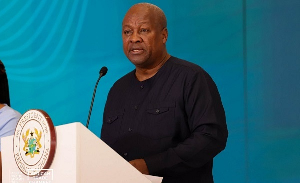Lagos -- BAD news, in the newsman's parlance, is good news. Not for Nollywood, the alias for Nigeria's home video industry, which was recently hit by bad weather in nearby Ghana.
Quoting a Ghana-based Nigerian business man, Mr. Uche Okafor, a newspaper reported last week that Nollywood productions were being shooed out of that country's movie market. He suggested that the authorities in Ghana might have banned the sale of movies originating from the highly prolific Nollywood. In his words, "Ghana is doing all, including outright seizure, to discourage the sale of Nigerian home videos in that country."
Mr. Okafor who was visiting Nigeria further said that movie distributors had had months of nightmarish experiences, both at the border and the streets of Accra for bringing in and selling Nigerian films and videos. It was further said that Ghanaian security officials were carrying out daily raids on sales outlets, ostensibly enforcing a yet-to-be-proclaimed official ban on Nigerian films and videos.
Confirming the incident, the Chairman of Onitsha Chamber of Commerce, Industry, Mines and Agriculture (ONICCIMA) who also leads Nigeria Film and Video Producers Association, Mr. Rob Emeka Eze, lamented the woes his members were being made to go through with regard to the Ghanaian situation, which has cost Nigerian producers and marketers about N150 million in lost revenue. He called on the civil regime of President John Kuffour to intervene without further delay and stop the embarrassing raids, as they portray the Ghanaian official as lawless.
Mr. Eze who was treating the matter with deserved seriousness said his association was planning a protest march on Abuja to consult with the relevant authorities, especially the federal ministries of Tourism, Information and National Orientation, Foreign Affairs, Finance, as well as the Presidency and Ghana High Commission.
True to our character, no one seems to have deemed it necessary to raise an eyebrow since this news broke in the press last week. Neither the Nigerian nor Ghanaian authorities would deny nor confirm the clearly spelled-out allegations of high-handedness and unwarranted molestation against the Ghana official.
By a strange coincidence, President John Kuffour, reputed to have launched Ghana into higher orbits in four short years, was supposed to be lined up for an honorary degree in Nigeria about the time of this wanton harassment of Nigerians.
But there are questions we must have answers to. Did the Nollywood productions at issue pass the test of Nigerian Film and Video Censors Board (NFCVB)? Passing this test is the first bureaucratic hurdle before debut into the Nigerian market. Is passing this Nigerian test all that is required to market the products outside Nigeria?
Definitely not, for each country has its own body of laws governing the dissemination of potent products like films and videos.
That is why questions must be asked and answers provided as to whether the exporters of films and videos took pains to satisfy the laws of Ghana as they had done for Nigeria. If our businessmen/distributors display avoidable insensitivity to the laws of other lands, I am afraid it is bad business for all concerned.
It is not enough to be well received in Nigeria as is the case with many of our local productions. Care must be taken to respect the sensibilities of the destination country. And these sensibilities need not - and do not - necessarily tally with ours.
If, however, the Ghanaian laws governing the circulation of such materials as films and videos have been complied with, in both letter and spirit, then the Ghanaian officials are infringing upon the fundamental human rights of our nationals in their country. Such an unwarranted lawlessness on the part of Ghanaian government officials should be challenged in a competent court of law in Ghana. Except that the Nigerian businessmen lack patience for the rigours of the long-winding judicial process, which often takes years to complete.
There is another hard-to-believe argument that the raiding Ghanaian officials are envious of the box office success of Nollywood productions in their country. Thus by restricting Nigerian movies, the demand for them would drop in favour of local productions.
This is the height of pettiness and naivete, for users of the products may not go for the second-best of what they want, just because someone is pretending that they are banned. By so doing these officials are limiting the possibilities of cultural intercourse that would take place via movies and videos. They are also stifling the operation of a free market place of ideas, thus abridging their citizens right to know, share and impart information without let or hindrance.
Entertainment of Thursday, 17 March 2005
Source: Daily Champion












